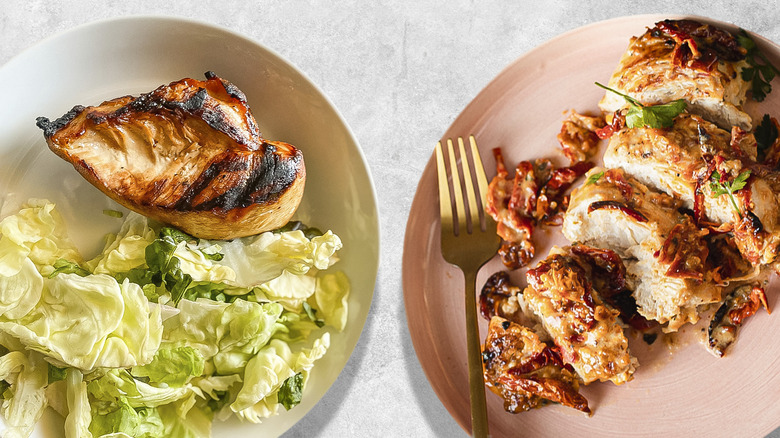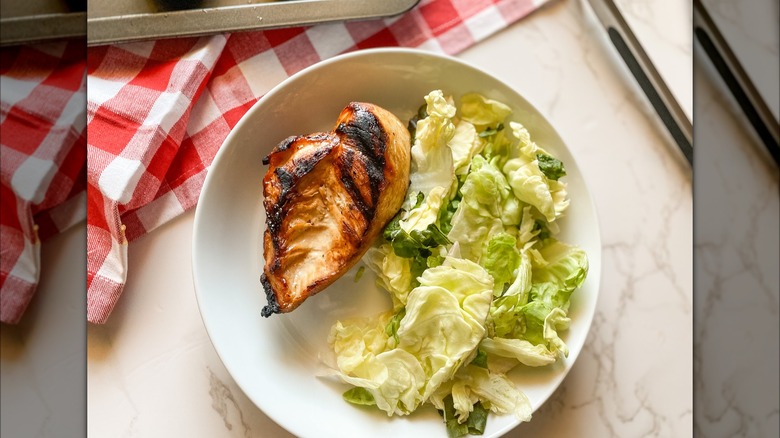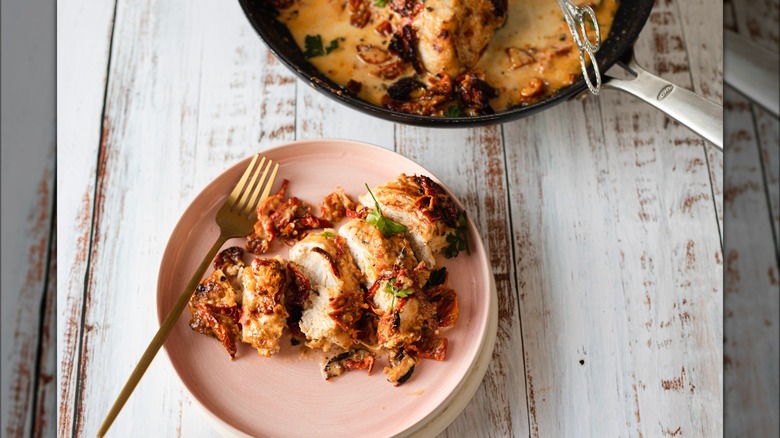Wedding Vs Marry Me Chicken: What's The Difference?
You may have heard of Marry Me Chicken and wedding chicken used somewhat interchangeably, but they're different recipes with different purposes. Not only that, but there are key differences in terms of how they're made and served.
The most obvious difference is in the names of each dish, which reference opposite ends of the marriage process. Wedding chicken gets its name from the fact that chicken is commonly served as a wedding meal, eaten after the vows have been made and the union sanctified. Marry Me Chicken, on the other hand, is said to be so good that it'll bring about the proposal itself if someone makes it for their partner.
The fact that chicken positions itself at the center of not one, not two, but three (we're counting Engagement Chicken here) wedding-themed dishes is somewhat impressive in itself. Chicken isn't exactly considered the food of love — that would be music, at least if your name is William Shakespeare — but it is the food of many possibilities. Since it's so easy to work with and season, it can be adapted to most situations — including marriage proposals, apparently.
So what's the difference between a meal designed to secure a proposal and one designed to secure the union for life? Quite a lot, actually. Both dishes contain chicken, but that's where their similarities end. Based on contributions from recipe developers Ksenia Prints and Kristen Carli, the only other ingredients you'll find in both dishes are salt, pepper, and garlic.
Wedding chicken's secret is in the marinade
Wedding chicken doesn't have a specific story, getting its name because it's a type of chicken served mostly by wedding caterers. If you've been to a well-catered wedding, you'll know that the chicken served at wedding receptions is uniquely good. Some folks have even taken to forums to discover the secret to getting such juicy, tender meat. Based on Kristen Carli's wedding chicken recipe, the key is two-fold: cooking to the right temperature, and marinating the chicken so it won't dry out.
Carli's marinade uses acidic sauces like fish sauce, tamari, and apple cider vinegar. Acid has a softening and denaturing effect on meat, breaking down proteins to create spaces for flavor to thrive in. When it comes to meat, chicken is high in protein, meaning more potential flavor pockets for your marinade to sink into. The flavor in Carli's wedding chicken comes from a warm kick of ginger and serrano peppers.
Once marinated, the chicken is grilled, which is where the importance of temperature comes in. Carli's recipe recommends that the chicken is heated to 165 degrees Fahrenheit, the minimum safe temperature recommended for poultry. Heating it to exactly this temperature means that the chicken will be as tender as it can possibly be while also being safe to consume. If you don't have a meat thermometer — and you should be using a meat thermometer – 20 minutes on a grill pre-heated to 475 degrees should do the trick.
Marry Me Chicken was born of excitement among colleagues
Unlike wedding chicken, which is grilled, Marry Me Chicken is served in a creamy, flavorful sauce. Recipe developer Ksenia Prints uses sun-dried tomatoes, oregano, chili, and Parmesan to flavor her Marry Me Chicken recipe, creating a delightful combination of herbiness, sweetness, and warmth.
Marry Me Chicken is a variation on creamy Tuscan chicken, created by former Delish executive editor Lindsay Fulston in 2016. According to Fulston's account, the name for this dish has a somewhat less superstition-inducing origin story than Engagement Chicken, although it's commonly mistaken for it. Where Engagement Chicken exists thanks to a 1982 Glamour office legend of one roast chicken recipe causing several marriage proposals, Fulston's original recipe name was changed based on colleague feedback.
Looking at the article's URL, the recipe was originally named "skillet Sicilian chicken." When Fulston served samples of the dish around the office, peers are alleged to have given rapturous praise, with marriage being a common theme. Per Delish, such compliments included "I'd marry you for that chicken" and "That's marriage material." The recipe name was changed, and Marry Me Chicken was born.


